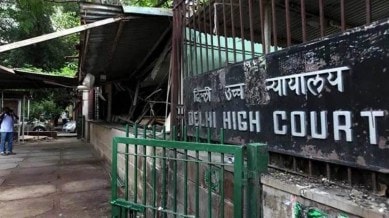Stay updated with the latest - Click here to follow us on Instagram
2020 Delhi riots: Actions of policemen amount to hate crime, says HC on death of man ‘forced to sing national anthem’
The Delhi High Court directed the CBI to probe the death of 23-year-old Faizan, who was seen in a purported video lying injured as security personnel allegedly forced him to sing 'Vande Mataram' and the national anthem during the 2020 Northeast Delhi riots.

Underlining that the policemen’s actions amounted to a “hate crime” that was “motivated and driven by religious bigotry,” the Delhi High Court Tuesday directed the Central Bureau of Investigation (CBI) to probe the death of 23-year-old Faizan during the Northeast Delhi riots in 2020.
The court took note of two purported videos that went viral online, in which the deceased was seen lying injured as policemen in riot gear were seen beating him; hurling abuses while forcing him to sing Vande Mataram and the national anthem during the 2020 riots.
monthly limit of free stories.
with an Express account.
“It is extremely important to note that this case presents allegations of gross violation of human rights, in as much as the unlawful actions of the policemen, who are yet to be identified, were motivated and driven by religious bigotry and, therefore, would amount to a ‘hate-crime’,” the HC said.
The HC was hearing a petition by Kismatun, the mother of Faizan, seeking a court-monitored SIT probe into her son’s death. Senior advocate Vrinda Grover appeared for the petitioner. In the petition, it was alleged Faizan was “targeted, brutally assaulted” and “injured by policemen” at Kardampuri and subsequently “illegally detained” in an injured condition at Jyoti Nagar police station between February 24-25, 2020. He was denied timely critical medical care resulting in his death later at a hospital, claimed the petition.
In the 38-page order by Justice Anup Jairam Bhambhani, the HC came down heavily on the Delhi Police, observing that “perpetrators of the crime are therefore still at large, though they are all members of the police force in Delhi.”
“Even if it is assumed that Faizan and/or the other young men had sustained some injuries earlier during rioting, several policemen present at the spot are clearly seen surrounding, dragging, kicking and striking blows on Faizan and the other young men with batons/ lathis; abusing them; and ordering them to sing the National Anthem while they are lying seriously injured and helpless on the roadside. All this has admittedly happened on 24.02.2020,” the order stated.
The HC noted that four-and-a-half years have elapsed and not even one policeman “involved in the abuse and assault conclusively (has been) identified in the course of the investigation” so far.
“Without making too much of a harsh comment, this court is constrained to observe that investigation in the present case has evidently been tardy, sketchy, and conveniently sparing of the persons who are suspected to be involved in brutally assaulting the petitioner’s son. What is worse is that the suspects were entrusted to act as custodians of the law, and were in a position of power and authority, but seemed to have been driven by bigoted mindsets,” it underlined.
Special Public Prosecutor Amit Prasad had told the court that the Delhi Police, at first, was unable to identify the policemen seen wielding lathis and kicking the men because all policemen on duty during the riots were in riot gear and their faces could not be seen in the video.
The order notes that during the course of the hearing, the police’s counsel had said “they have put two policemen, a head constable and a constable — identified as being present at the spot at the relevant time — through a polygraph test at FSL Rohini”. It was stated that the responses of these policemen were found to be “deceptive”. It was also stated that the “two policemen” had been put through a voice-matching test, wherein their voice samples had matched certain words spoken at the spot.
However, the HC said “there is no gainsaying that what the Delhi Police have done so far is too little, too late”.
“In the opinion of this court, transfer of investigation is necessitated in the present case to guard the credibility of the investigation and to instill confidence in the victims as to the fairness of the process, if for no other reason,” the High Court said, directing the investigating officer concerned to transfer all records, including material and evidence collected and statements recorded in the case so far, to the Director, CBI, in 7 days.
The HC also noted that it has refrained from engaging in any detailed consideration of evidence collected by the investigating officer so far, some of which have been shared with the court “during hearings in-chamber”.
Referring to the Supreme Court’s 2018 decision in ‘Tehseen S Poonawalla vs Union of India & others’, the High Court said the apex court has enunciated the meaning and articulated the “abhorrent” nature of hate crime, in the context of mob vigilantism and mob violence.
“It must be understood that mob vigilantism and mob violence do not cease to be so merely because these are perpetrated, not by ordinary citizens, but by policemen themselves. If anything, the element of abomination gets aggravated if a hate crime is committed by persons in uniform,” the HC said.